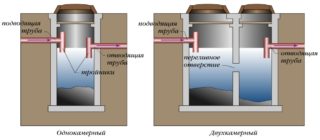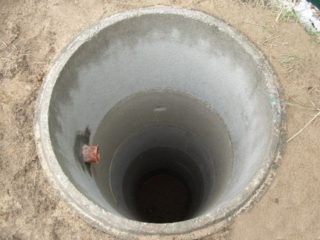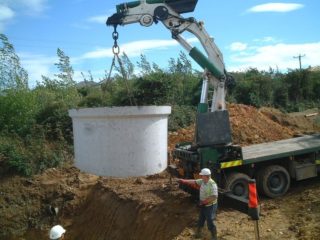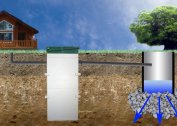In the private sector or holiday village, where there is no centralized sewage system, it is necessary to equip your own septic tank for wastewater collection. There are several ways to do this. One of them is to dig a hole in a convenient place so that the machine can freely drive up and pump out waste, pour concrete on the walls, equip the hatch. Pipes along which sewage flows down are mounted during the construction phase of the house.
Types of Sewerage
On the site, you can install the sewer system of two types - a cesspool of concrete rings with a sealed bottom and a double cleaning system. In the first case, the cesspool needs to be periodically cleaned with a vacuum cleaner, lowering the hose to the bottom. The advantage of such a system is a quick and easy installation, which can be done independently. This design costs cheap: you need to buy rings and order equipment that will help lower them into the pit.
Less - the owners will depend on whether the car arrives on time to pump out the wastewater, and you will have to pay regularly - about once a month. With permanent residence, it is better to overpay at the construction stage, but pay less attention to the septic tank during operation. The two-stage cleaning system is:
- Sump, where waste comes directly from the house. For several days, the liquid is in the first tank, where it is exposed to bacteria that operate without access of air - anaerobic. Large particles settle to the bottom.
- After the first sump, the liquid enters the second, where it is affected by microorganisms that need oxygen - aerobic for life. There, the liquid is completely cleaned of the pathogenic flora and then goes through the perforated bottom to the ground. Additionally, a filtering pad is made of crushed stone, sand and soil.
This method will cost more, but there will be less problems with sewage. Once every 2 years, you need to add an activator to the first well and allow bacteria to process the waste, which is then used as fertilizer on the site.
For two-stage cleaning, you will have to equip two septic tanks, located alternately one after the other. Consequently, it will take more building materials and time. Such work is best done at the construction stage of the house, after calculating the number of residents and water consumption per day.
Absorption drainage well
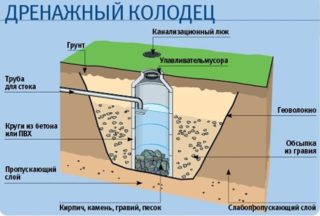 Designed to drain from the rainwater area. This is the final reservoir into which fluid flows after precipitation. It is more rational to equip a separate drain for clean water and then use it to water the garden. In the tank, the liquid settles, the sand settles to the bottom. Using the pump, the container can be emptied for the next portion of water.
Designed to drain from the rainwater area. This is the final reservoir into which fluid flows after precipitation. It is more rational to equip a separate drain for clean water and then use it to water the garden. In the tank, the liquid settles, the sand settles to the bottom. Using the pump, the container can be emptied for the next portion of water.
You can make a joint drain, but it quickly fills up and requires pumping. If you do not remove the fluid in time, the outflow of water from the house will be difficult.
The drainage well is not very large. The diameter of the concrete rings does not exceed 1.5 m, and the installation depth is 2 m. For summer residents, this is a good help on the farm, as rainwater is clean and soft, plants absorb it with pleasure.
Technical characteristics of concrete rings
To equip a septic tank, you need to buy ready-made rings and install them in a pit. Material for sewage should resist moisture for a long time and not collapse. These properties have plastic and reinforced concrete rings. You can use both.
For the construction of a septic tank, various sizes of reinforced concrete sewer rings are used - from 1 to 2 meters in diameter. The wall thickness is from 8 to 10 cm. It depends on how much time the residents plan to spend in a country house. If constant, then the water flow and the amount of wastewater will be greater. For a summer cottage, rings with a diameter of 1 m and a height of 90 cm are suitable.
Several types of reinforced concrete rings are available:
- with a closed bottom - for installation as the first structural element;
- filtration - without a sealed bottom: a special embankment plays the role of a filter;
- elements with or without a lock;
- a ring with a hole for the hatch to cover the top of the septic tank.
The height of each part is calculated based on the design documentation. In case of lack of details, you can buy additional rings, which have a small height - up to 30 cm.
Castle connection
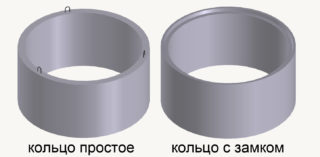 Concrete rings with a lock - a convenient option for creating a sewer. After their installation there is no need to use a sealant, since the seams are well connected. The lock is a recess that fits snugly into the lower ring. After installation, there is no risk that the structure will move.
Concrete rings with a lock - a convenient option for creating a sewer. After their installation there is no need to use a sealant, since the seams are well connected. The lock is a recess that fits snugly into the lower ring. After installation, there is no risk that the structure will move.
It is important that all lock rings are purchased from the same manufacturer. If the diameter of the lock does not match, because the manufacturers do not adhere to standard sizes, it will be impossible to achieve a tight joint.
Straight rings
Direct reinforced concrete rings are mounted one on top of the other and sealed separately after installation. On the inside - with concrete plaster, with the outside - bitumen-based putty to prevent the penetration of wastewater into the environment. The junction is also concreted.
To hold the structure, iron brackets are used that fix the rings and prevent them from moving relative to each other.
Advantages and disadvantages of concrete ring sewers
Concrete rings are a durable material that will last for many years without the need for repairs. It is important to properly install and seal them. The construction of concrete rings is smooth, which is difficult to achieve if you lay out a septic tank made of stone or brick. In addition, time is saved, as the plaster and its final drying take more than a week. The concrete structure can be carefully sealed so that untreated sewage does not enter the soil. This effect cannot be achieved if the sewer tank is made of rubber tires.
Iron rods inside the concrete give strength, so that it is not exposed to low and high temperatures, therefore, it lasts longer.
Cons of concrete construction:
- The material has a rough surface, so the angle of inclination of the pipes will have to be increased to reduce the risk of clogging of drains.
- Manually complete the installation will not work, since each ring weighs about 400 kg. Need a technique with a crane to smoothly lower the concrete rings into the pit.
- Depending on the type of soil in the area, the well of the second type - filtering - can not always be mounted, since the liquid will not be able to quickly absorb into the ground. If the main soil type is clay or loam, the liquid will stagnate. On sandy and sandy loamy soils - this is the best method of organizing a sewer system in a private house.
Check the soil as follows: dig a hole and fill it with water. If the liquid is absorbed in 18 to 20 seconds, then the main component of the soil is sand. If a minute - sandy loamy or loamy soil. More than 2 minutes - clay.
Before starting work, it is necessary to carry out calculations, from which it will be seen at what depth groundwater is located. It is also important to determine the lowest point of the site and the distance to fruit trees and beds, as well as to the drinking well.
Design and implementation of necessary calculations
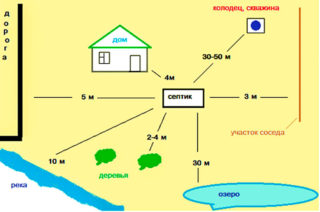 According to sanitary and epidemiological standards, the groundwater level should be at least 1.5 m below the bottom of the well. In the event that a stock of semi-purified liquid is provided. The optimal distance is 2 - 2.5 m.
According to sanitary and epidemiological standards, the groundwater level should be at least 1.5 m below the bottom of the well. In the event that a stock of semi-purified liquid is provided. The optimal distance is 2 - 2.5 m.
If the site has a well with drinking water, a septic tank with a perforated bottom must be located 50 m from the well. This will reduce the risk of infection in the water and the development of diseases of the gastrointestinal tract.
From the house to the septic tank, the distance should be at least 10 meters.
Absorption capacity of sand per day is 80 liters, sandy loam soil mixture is 40 liters, loam is able to absorb only 25 liters of liquid, and clay is only 5. Based on these indicators, filtering wells are allowed to be installed only on sand or sandstone. In other cases, only a sealed septic tank. The average daily amount of wastewater should not exceed 1 cubic meter.
Design a sewer system at the request of the owner of the site. It can be a separate system: the liquid from the toilet enters one tank, and the wastewater from the washing machine, kitchen, bathroom into another. For the equipment of such a multi-level system, it is necessary to have a sufficiently large area of the site, since on a small sewer manholes will be found at every step and spoil the appearance.
Several tanks are installed in a private house where several household appliances, such as a dishwasher and washing machine, are planned. If there are several bathrooms, the water flow will increase, and the septic tank will fill up faster.
Installation Steps
After designing the sewer, they begin to bookmark it. At the first stage, they dig one or more pits, depending on the type. The distance from the walls of the pit to the concrete rings must be at least 30 cm so that the rings can be installed without problems.
Before installing the rings in them, it is necessary to make holes for the pipes - inlet and outlet. In this case, the inlet is made larger. The ventilation pipe is installed in the second tank for air intake, since bacteria that require oxygen are functioning in it. The pipe is led from below at an angle, and its upper part rises above the site by 0.5 - 1 m.
If the bottom is tight, then a sand pillow is poured under it. Allow space for the vent pipe. Next, the rings are stacked on top of each other and sealed with plaster inside and bitumen outside. After that, the pipes are let down. It is desirable that the line has a water seal. This will prevent sewage from entering the house. For this, the pipes are connected with a bend. If rings without a lock are used, then a plastic gasket can be inserted inside the well so that the waterproofing works without leakage.
If the construction of the house is carried out in parallel with the arrangement of the sewage system, then the next moment is the laying of pipes in the house and their output to the street.
The order of installation of sewer pipes:
- At the exit of the plastic pipe from the house, a trench is being digged. Its depth depends on how far the sump is. The angle must be observed to prevent blockages.
- Pipes are connected and sealed. Before laying, it is necessary to fix the trunk at the desired angle and add soil to the pipe to fit snugly. Some craftsmen specially water the soil with water so that it condenses, and only then lay the plastic.
- The entry point is sealed. The inlet should be higher than the outlet.
The trench is covered with soil and rammed. Sewer well cover with a concrete cover with a cutout for the hatch. On this installation ends, the pit is filled with soil mixed with sand. The hatch should always rise above the level of the site so that excessive precipitation does not provoke flooding of the septic tank.
Reinforced concrete sewer rings prices
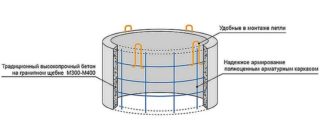 The cost of rings for sewage depends on:
The cost of rings for sewage depends on:
- from wall thickness - the thicker, the more expensive;
- from the height of the concrete product;
- from diameter.
The quality of concrete itself plays a role in pricing, as well as the presence of a metal base in the form of iron rods of different diameters.
The cost of blank bottom parts is higher since the consumption of raw materials in production is greater. But for a septic tank, one such ring is enough. To the cost of concrete rings add the price of the cover with a cutout for the hatch, on which a plastic cover is still installed.
If you need to equip a second well with lower holes for drainage, it will cost more than the first. No need to risk the product, trying to punch the bottom holes yourself. This is fraught with destruction of the bottom.
In order to comply with all the standards for sewage, it is necessary to consult in several instances, as well as in the construction company, which is engaged in the arrangement of sewage in a private house. After that, evaluate your strength and experience. The best option is to invite a team of specialists who will quickly and efficiently perform the work.
